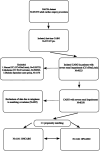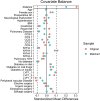Effect of on-pump vs. off-pump coronary artery bypass grafting in patients with non-dialysis-dependent severe renal impairment: propensity-matched analysis from the UK registry dataset
- PMID: 38414924
- PMCID: PMC10897021
- DOI: 10.3389/fcvm.2024.1341123
Effect of on-pump vs. off-pump coronary artery bypass grafting in patients with non-dialysis-dependent severe renal impairment: propensity-matched analysis from the UK registry dataset
Abstract
Introduction: On-pump coronary artery bypass (ONCABG) grafting in patients with a pre-existing poor renal reserve is known to carry significant morbidity and mortality. There is limited controversial evidence on the benefit of off-pump coronary artery bypass (OPCABG) grafting in these high-risk groups of patients. We compared early clinical outcomes in propensity-matched cohorts of patients with non-dialysis-dependent pre-operative severe renal impairment undergoing OPCABG vs. ONCABG, captured in a large national registry dataset.
Methods: All data for patients with a pre-operative creatinine clearance of less than 50 mL/min who underwent elective or urgent isolated OPCABG or ONCABG from 1996 to 2019 were extracted from the UK National Adult Cardiac Surgery Audit (NACSA) database. Propensity score matching was performed using 1:1 nearest neighbor matching without replacement using several baseline characteristics. We investigated the effect of ONCABG vs. OPCABG in the matched cohort using cluster-robust standard error regression.
Results: We identified 8,628 patients with severe renal impairment undergoing isolated CABG, of whom 1,142 (13.23%) underwent OPCABG during the study period. We compared 1,141 propensity-matched pairs of patients undergoing OPCABG vs. ONCABG. The median age of the matched population was 78 years in both groups, with no significant imbalance post-matching in the rest of the variables. There was no difference between OPCABG and ONCABG in in-hospital mortality rates, post-operative dialysis, and stroke rates. However, the return to theatre for bleeding or tamponade was higher in ONCABG vs. OPCABG (P > 0.02); however, OPCABG reduced the total length of stay in the hospital by 1 day (P = 0.008). After double adjustment in the matched population using cluster-robust standard regression, ONCABG did not increase mortality compared to OPCABG (OR, 1.05, P = 0.78), postoperative stroke (OR, 1.7, P = 0.12), and dialysis (OR, 0.7, P = 0.09); however, ONCABG was associated with an increased risk of bleeding (OR, 1.53, P = 0.03).
Discussion: In this propensity analysis of a large national registry dataset, we found no difference in early mortality and stroke in patients with pre-operative severe renal impairment undergoing OPCABG or ONCABG surgery; however, ONCABG was associated with an increased risk of return to theatre for bleeding and an increased length of hospital stay.
Keywords: coronary artery bypass grafting; coronary disease; off-pump coronary artery bypass grafting; outcomes; renal dysfunction.
© 2024 Fudulu, Argyriou, Kota, Chan, Vohra, Caputo, Zakkar and Angelini.
Conflict of interest statement
The authors declare that the research was conducted in the absence of any commercial or financial relationships that could be construed as a potential conflict of interest. The author(s) declared that they were an editorial board member of Frontiers at the time of submission. This had no impact on the peer review process or the final decision.
Figures
Similar articles
-
Off-pump versus on-pump coronary artery bypass grafting in elderly patients at 30 days: a propensity score matching study.Postgrad Med J. 2024 May 18;100(1184):414-420. doi: 10.1093/postmj/qgad120. Postgrad Med J. 2024. PMID: 38330496
-
Is off-pump technique a safer procedure for coronary revascularization? A propensity score analysis of 20 years of experience.Interact Cardiovasc Thorac Surg. 2016 May;22(5):612-8. doi: 10.1093/icvts/ivw005. Epub 2016 Feb 16. Interact Cardiovasc Thorac Surg. 2016. PMID: 26888744 Free PMC article.
-
Coronary artery bypass grafting in high-RISk patients randomised to off- or on-Pump surgery: a randomised controlled trial (the CRISP trial).Health Technol Assess. 2014 Jul;18(44):v-xx, 1-157. doi: 10.3310/hta18440. Health Technol Assess. 2014. PMID: 25023641 Free PMC article. Clinical Trial.
-
Meta-Analysis of Repeat Revascularization of Off-Pump and On-Pump Coronary Artery Bypass Surgery.Ann Thorac Surg. 2018 Aug;106(2):526-531. doi: 10.1016/j.athoracsur.2018.02.068. Epub 2018 Mar 30. Ann Thorac Surg. 2018. PMID: 29608874 Review.
-
Meta-analysis of short-term and mid-term outcomes following off-pump coronary artery bypass grafting.Ann Thorac Surg. 2003 Nov;76(5):1510-5. doi: 10.1016/s0003-4975(03)01195-0. Ann Thorac Surg. 2003. PMID: 14602277 Review.
Cited by
-
Case Report: Staged surgical management in ESRD: off-pump CABG followed by renal transplantation to enhance graft survival.Front Cardiovasc Med. 2025 Feb 7;12:1486771. doi: 10.3389/fcvm.2025.1486771. eCollection 2025. Front Cardiovasc Med. 2025. PMID: 39991633 Free PMC article.
-
Off-pump vs. on-pump coronary artery bypass grafting in patients with chronic kidney disease: an updated systematic review and meta-analysis.Int Urol Nephrol. 2025 Feb;57(2):463-477. doi: 10.1007/s11255-024-04198-z. Epub 2024 Sep 9. Int Urol Nephrol. 2025. PMID: 39249666
References
-
- Merkle J, Sunny J, Ehlscheid L, Sabashnikov A, Weber C, Eghbalzadeh K, et al. Early and long-term outcomes of coronary artery bypass surgery with and without use of heart-lung machine and with special respect to renal function—a retrospective study. PLoS One. (2019) 14(10):e0223806. 10.1371/journal.pone.0223806 - DOI - PMC - PubMed
-
- Sajja LR, Mannam G, Chakravarthi RM, Sompalli S, Naidu SK, Somaraju B, et al. Coronary artery bypass grafting with or without cardiopulmonary bypass in patients with preoperative non-dialysis dependent renal insufficiency: a randomized study. J Thorac Cardiovasc Surg. (2007) 133(2):378–88. 10.1016/j.jtcvs.2006.09.028 - DOI - PubMed
Grants and funding
LinkOut - more resources
Full Text Sources



